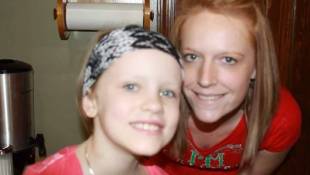Part Three of a Series
When Dr. Nancy Swigonski was doing her pediatric residency in the mid 1980s, developmental screening wasn’t part of a well-child checkup.
Today the American Academy of Pediatrics recommends children from ages birth to three years receive standardized monitoring for developmental and autism disorders. Until recently, families in Indiana didn’t have a lot of places to turn.
“Just imagine if you went into your pediatrician and they said ‘your child may have a problem, wait a year and we’ll find out,’” said Swigonski, a professor of pediatrics and public health at the Fairbanks School of Public Health.
For the past two years, she has been leading an effort to encourage more Indiana pediatricians to provide early screening. She has also been advocating the creation of Early Evaluation Hubs across the state where children can receive the testing and medical workups necessary for appropriate intervention services.
Early diagnosis and intervention is critical, research shows. It helps strengthen the brain, improve behavior, educational progress and ultimately job attainment.
According to Swigonski, the average age at which an Indiana child receives an autism diagnosis – 5.3 years -- far exceeds the ideal age of 3 years, as established by federal health guidelines. Through the state’s nine Early Evaluation Hubs, however, the age of diagnosis for autism spectrum disorder or other developmental delay is much earlier – 2.4 years old.
The hubs operate in health clinics, hospitals and specialty centers. A tenth center is proposed for the northwest corner of the state. She says the centers have vowed to work together to close the gaps for diagnosis and care, even if they lose money.
And money plays a big part in the disparity of who receives treatment in Indiana and who doesn’t - even as more signs point to the importance of early diagnosis.
“We know that early intervention is critical, but if you don’t have the financial means, what are you going to do?” said Dana Renay, the Chief Executive Ally at the Autism Society of Indiana.
Renay knows what it means for a family to cope with autism.
At age 3, her son Jacob wasn’t talking yet. Her pediatrician told her not to worry, but at the urging of her stepmother, she took Jacob to Riley Child Development Center for evaluation.
“At age 3, he was non-verbal. Everyone told me he would never live a normal life,” she said.
Renay pointed to a picture of a smiling young man – her son’s recent school photo. “And he just had his bar mitzvah on Saturday.”
But it came at a cost – Renay left her corporate job and tapped her retirement savings to pay for Jacob’s treatment. Many families don’t have those options.
Steve Viehweg, an assistant research professor at the IU School of Medicine, has been working to implement an approach called the “Infant Mental Health Endorsement Model.” It offers certification to early childhood providers – including childcare workers, preschool teachers and doctors – who can help identify early signs of developmental disabilities in children.
“If we have people on all those levels and we can get them connected to the therapist who is a social worker or a psychologist who has this specialty, think about what we could do,” Viehweg said.
 DONATE
DONATE







 View More Articles
View More Articles



 Support WFYI. We can't do it without you.
Support WFYI. We can't do it without you.